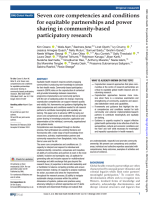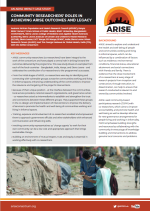Equitable health research requires actively engaging communities in producing new knowledge to advocate for their health needs. Community-based participatory research (CBPR) relies on the coproduction of contextual and grounded knowledge between researchers, programme implementers and community partners with the aim of catalysing action for change. Improving coproduction competencies can support research quality and validity. Yet, […]
ARISE aimed to explore and understand the health and well-being of people and communities working and living in informal spaces, which can be influenced by a combination of factors such as residence, environmental conditions, financial status, educational attainment and social connections with friends and family. There is evidence that the close involvement of co-researchers at […]
Abstract This article critically reviews the literature on urban informality, inequity, health, well-being and accountability to identify key conceptual, methodological and empirical gaps in academic and policy discourses. We argue that critical attention to power dynamics is often a key missing element in these discourses and make the case for explicit attention to the operation […]
Co-production requires dismantling existing power hierarchies. As such, it can support decolonising knowledge generation and fostering inclusive and equitable relationships with diverse (and at times) marginalised actors participating in health governance, research and decision-making. Decolonising knowledge production recognises that expertise lies with those communities directly affected by health inequities and challenges as well as other […]
Decolonising health research requires a shift to inclusive processes, and actively engaging with communities. Community-based participatory research (CBPR) fosters collaboration among communities, researchers, and implementers to produce contextual knowledge for action. Enhancing co-production skills and competencies has been shown to improve research quality and validity, while CBPR principles have been developed, limited guidance exists on […]
Abstract Slums and informal settlements have long been a policy concern, particularly in post-independence cities of the global South. Although national and local governments devise public policy seeking to address these habitations, these policy initiatives occur in conversation with the often far less visible global policy discourses of international urban development actors. Positing their ideational […]
Abstract The complexity of issues addressed by research for development (R4D) requires collaborations between partners from a range of disciplines and cultural contexts. Power asymmetries within such partnerships may obstruct the fair distribution of resources, responsibilities and benefits across all partners. This paper presents a cross-case analysis of five R4D partnership evaluations, their methods and […]






